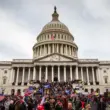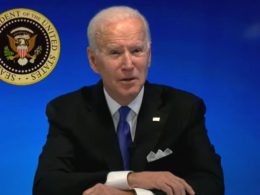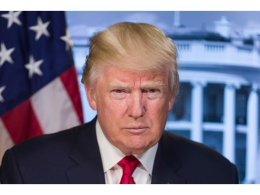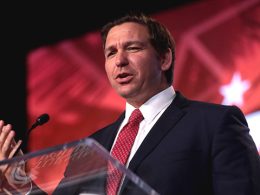“Because the call of shots fired had went out,” Byrd says, “you know, it was later I found out that the subject did not have a weapon, but there was no way to know that at that time. And I could not fully see her hands or what was in the backpack or what the intentions of. But they had shown violence leading up to that point.”
The name of the man who shot unarmed veteran Ashli Babbitt, a protestor at the Capitol on January 6 and the only person to die from injuries sustained on that day, was announced by the family’s lawyer Terry Roberts in a preemptive interview with Newsmax.
Aaron Babbitt, Ashli’s husband, has been fighting for the name of his wife’s killer to be released since her death. After seven long months of fighting what they consider a cover-up, Roberts announced that Ashli Babbitt’s shooter was Capitol Police Lieutenant Michael Leroy Byrd.
Critics say the identity of police officers in America who shoot unarmed victims is usually announced before the victim’s name had been authenticated. So why the need to keep him a secret?
PRESS RELEASE
Attorney for Babbitt Family, Terry Roberts responds to statements made by Michael Byrd.
Although Byrd said that he followed his police training, that is not the case at all.
Here's why. pic.twitter.com/3ViqUq7r09
— Justice For Ashli Babbitt (@ForAshli) August 28, 2021
“The U.S. Congress wants to protect this man. He’s got friends in high places, and they want to protect him,” believes Terry Roberts. He said the shooting and then the attempt to run cover for Ashli Babbitt’s killer is no “a proud moment for the U.S. Capitol Police or the U.S. Congress.”
In a June interview with Tucker Carlson, Aaron Babbitt and his lawyer Terry Roberts discussed the possibility of the shooter being Michael Byrd without mentioning his name.
Tucker asked Robert whether it was true “that the Capitol Hill police officer who shot Ashli Babbitt … was the same officer that left his loaded handgun in a public men’s room at the Capitol.” He asked, “Do you believe that this is the officer; it seems like a very reckless person, who shot and killed Ashlu Babbitt on January 6?”
Roberts responded, “That’s my belief. That’s my belief.”
NBC reported on August 20 that Byrd was “exonerated” by an internal investigation against any wrongdoing in the shooting of unarmed Ashli Babbitt. Byrd’s lawyer, Mark Schamel, told NBC that this was the “only correct conclusion following the events of January 6.”
Byrd went on NBC Nightly News to explain why he shot an unarmed American after giving no verbal warnings before firing. Byrd admitted in his interview that he was afraid of the 110 lb unarmed woman, and although she was unarmed and he could have physically restrained her if she made it through the door, killing her “saved countless lives.”
The new standard for police excellence inside the Capitol Hill Police means shooting everyone you are afraid of- a professional courtesy that is not extended to the police officers actually risking their lives daily.
— Justice For Ashli Babbitt (@ForAshli) August 28, 2021
Although those authorities did not find a single weapon at the Capitol – it’s hard to have an insurrection if you don’t have a weapon – Byrd claimed, “I know that day I saved countless lives. I know members of Congress, as well as my fellow officers and staff, were in jeopardy and in serious danger. That’s my job.”
The only video available of the shooting shows Byrd hiding in the vestibule with a loaded gun. Byrd had stated that he yelled to “please stop, get back, get back, stop.” Only one witness has backed up this statement. Many others claim they saw the gun and started informing others that the weapon was pointed at them right before the shot was fired.
“What made you pull the trigger?” Holt asks. “Last resort,” Byrd replies. “I tried to wait as long as I could . . . but their failure to comply required me to take the appropriate action . . .” The video shows he spent 14 seconds. That is how long he waited before he decided to kill Ashli Babbitt.
Criminal defense attorney and renowned law professor Jonathan Turley wrote that he didn’t believe the shooting was justified in an op-ed for The Hill. He wrote, “The DOJ statement notably does not say that the shooting was clearly justified. Instead, it stressed that ‘prosecutors would have to prove not only that the officer used force that was constitutionally unreasonable, but that the officer did so ‘willfully.'” It seemed simply to shrug and say that the DOJ did not believe it could prove “a bad purpose to disregard the law’ and that ‘evidence that an officer acted out of fear, mistake, panic, misperception, negligence, or even poor judgment cannot establish the high level of intent.’ ”
Byrd claimed, “I know based on my training and my policy, what I did was appropriate.”
Retired LAPD Jack Dunphy disagreed with Michael Byrd’s interview. He wrote, “In the NBC interview, Byrd presented himself as conscientious and well-meaning, but most police officers can readily recognize him for what he is: a long-serving middle manager of modest abilities, one who should be nowhere near any situation requiring split-second, life-and-death decisions. It was a bad shooting, and no amount of spin can make it otherwise. Babbitt’s family will prevail in their civil suit, as they should.”
MICHAEL BYRD FULL 38 MINUTE INTERVIEW
You be the judge. Drop your thoughts below.https://t.co/CPYIecA6iD
— Justice For Ashli Babbitt (@ForAshli) August 29, 2021
Follow Marmee Rooke: Gettr Twitter
Follow Tatum Report: Gettr Instagram Twitter Facebook
- Ukraine Slams Biden Admin’s Hysterics; Says Americans Are Safer In Kyiv Than LA - January 24, 2022
- Virginia Attorney General Files Motion To Dismiss Case Against Youngkin’s Anti-Mandate EO - January 21, 2022
- Are M&M’s Woke? Exec Says The Company Is Making The Candy Characters More ‘Inclusive’ - January 21, 2022










